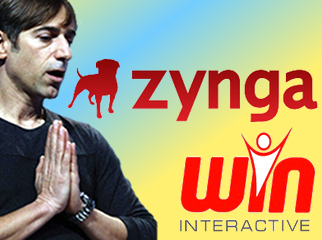 Win Interactive, the social gaming unit of pan-European online gambling operator Bwin.party digital entertainment, has released its first social casino title. Win Interactive CEO Barak Rabinowitz called the release of Slots Craze “the beginning of an ambitious product release schedule of cutting-edge entertainment” that “delivers an unrivaled user experience” via “premium production value and compelling gameplay.” Inside Social Games waxed somewhat less enthusiastically, calling the Slots Craze a “fairly standard slots game with high-quality art.” Slots Craze is available on Facebook and iOS devices.
Win Interactive, the social gaming unit of pan-European online gambling operator Bwin.party digital entertainment, has released its first social casino title. Win Interactive CEO Barak Rabinowitz called the release of Slots Craze “the beginning of an ambitious product release schedule of cutting-edge entertainment” that “delivers an unrivaled user experience” via “premium production value and compelling gameplay.” Inside Social Games waxed somewhat less enthusiastically, calling the Slots Craze a “fairly standard slots game with high-quality art.” Slots Craze is available on Facebook and iOS devices.
As Bwin.party moves into the social scene, social gamers Zynga are prepping their real-money gambling offering in the UK via their partnership with Bwin.party. Speaking at a Morgan Stanley tech conference in San Francisco on Monday, Zynga CEO Mark Pincus said he believes his company will be able to make online gambling appealing to “the mass market audience” rather than attempting to win over “hardcore real-money gamers.” Pincus said the social nature of his company’s products will make winning a big poker pot in full view of (and possibly from) people you know “more exciting than when you’re by yourself in an anonymous poker room.” Pincus declined to offer how much more exciting it will be when your friends see you lose your non-virtual bankroll on an ill-advised shove.
Despite his stated aversion to hardcore gamers, Pincus said he was hoping to bring real-money gambling to Zynga’s entire player base, not just Zynga Poker fans, as well as introducing Zynga’s über-social approach to online poker fans in general. Pincus hoped to be able to apply Zynga’s unique data and analytics to “what is already a very data-intensive marketing business.”
Pincus expects his company’s Nevada online poker license application will take 12-18 months to process, but declined predictions on how things might roll out outside Nevada. Pincus described the US market for real-money gambling as a “hurry up and wait” situation, although one that “keeps feeling more imminent.” Pincus compared the future US market to the EU, in which regulations vary slightly from state to state, and said decisions to enter this or that state would be made based in part on the number of potential gamers within each state’s borders.
Meanwhile, Zynga continues to aggressively trim its costs, closing its game studio in Baltimore that worked on the failed CityVille 2 game (which is signing off forever on March 7). The office contained about 30 employees, half of whom Zynga says accepted offers to relocate to other Zynga offices. Zynga has also closed two Texas offices and consolidated their operations in Dallas and North Austin, as well as combining two New York offices into one mobile studio. All told, the latest moves affect 1% of Zynga’s total remaining staff of 3k employees.
